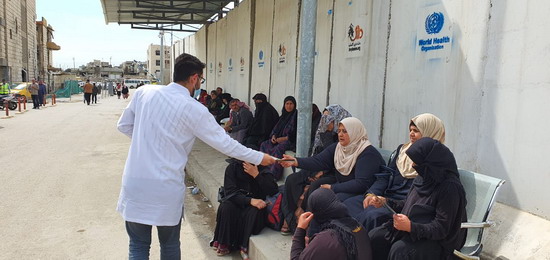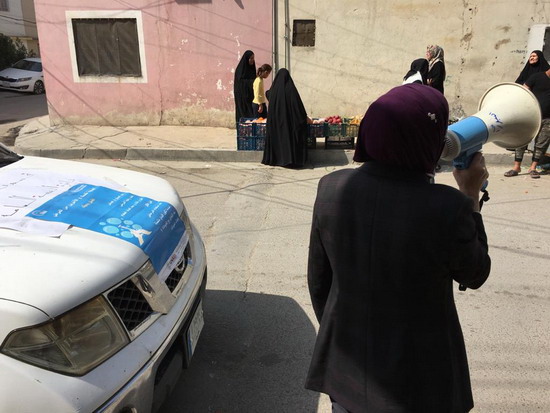 WHO in Iraq, in cooperation with local health authorities, mobilized every resource to reach citizens in every corner of the country to raise community awareness of how to protect themselves against COVID-19. Photo: WHO/raq Baghdad, Iraq, 28 May 2020 – Since the beginning of the COVID-19 pandemic, The World Health Organization (WHO) has focused on fighting the pandemic with every tool at its disposal to save lives and support countries with limited COVID-19 response capacity, including Iraq.
WHO in Iraq, in cooperation with local health authorities, mobilized every resource to reach citizens in every corner of the country to raise community awareness of how to protect themselves against COVID-19. Photo: WHO/raq Baghdad, Iraq, 28 May 2020 – Since the beginning of the COVID-19 pandemic, The World Health Organization (WHO) has focused on fighting the pandemic with every tool at its disposal to save lives and support countries with limited COVID-19 response capacity, including Iraq.
WHO and the Iraqi health authorities proactively coordinated a comprehensive response to the pandemic as early as January 2020. The Organization scaled up the country’s readiness and response operations mechanism, as well as the pandemic preparedness plan of action.
Several important actions by the Ministry of Health at both central and regional level were taken in coordination with WHO before the reporting of the first case in the country on 24 February 2020. These actions included enhancing coordination and planning among all stakeholders and partners at national and international levels, communicating with communities about the risks and how people could protect themselves, and finding, isolating, testing, tracing every contact, and treating every case.
A joint technical team from the WHO Regional Office and headquarters arrived in Iraq on 9 March to assess the capacity of the Iraqi Ministry of Health and health facilities on disease detection, identification and case management. The team provided guidance to address gaps according to priority and assisted in improving the health measures taken by the Government. Designated hospitals were accordingly prepared to respond to a potential spike in the number of cases with a focus on protecting and training health workers on a variety of associated topics like infection prevention and control and case management.
“The Government of Iraq, with the full support of WHO, mobilized resources at an early stage of the pandemic to contain its transmission. National, regional and local authorities implemented strong measures to reduce the number of cases and suppress the rapid spread of the virus. These early preventive actions contributed to extending and delaying the epidemiological curve, resulting in comparatively fewer documented cases compared to neighbouring countries,” said Dr Adham R. Ismail, WHO Representative in Iraq.
WHO support to the national health authorities also included active surveillance, situation assessment and analysis, and awareness-raising sessions targeting first-line staff at border points and airports.
Rapid response teams were also mobilized to carry out country-wide awareness raising and contact tracing and testing activities, including disseminating infection prevention and control messages and guidelines.
 Case management and continuity of essential services, in addition to logistics, procurement and supply management were among the priority actions WHO and the ministries of health at both central and regional level took and closely coordinated at an early stage of the response.
Case management and continuity of essential services, in addition to logistics, procurement and supply management were among the priority actions WHO and the ministries of health at both central and regional level took and closely coordinated at an early stage of the response.
The Organization, furthermore, lead a series of activities encouraging adherence to the lockdown and avoidance of mass gatherings that could lead to an increase in the numbers of cases. The WHO Representative visited the religious Supreme Seminary in Najaf and recommended the postponement of religious gatherings. “WHO commends the stance of the Supreme Seminary in support of WHO and Ministry of Health recommendations and commends its positive response in encouraging the people of Iraq people to follow health preventive measures and recommendations,” added Dr Ismail.
The provision of laboratory services was also promoted. Direct cooperation between WHO and the COVID-19 Crisis Cell of Basra University succeeded in April 2020 in producing urgently needed laboratory supplies to speed up the testing of suspected cases. This significant achievement was later replicated by other countries in the Region.
On 20 May of this year, Heads of Government from around the world joined the World Health Assembly to discuss lessons, challenges and collective next steps to tackle the pandemic. The Health Assembly productively concluded with a landmark resolution underlining WHO’s key role in promoting access to safe and effective health technologies to fight the pandemic.
“The resolution sets out a clear roadmap of the critical activities and actions that must be taken to sustain and accelerate the response at the national and international levels,” said WHO Director-General Dr Tedros Adhanom. “The resolution assigns responsibilities for both WHO and its Member States and captures the comprehensive whole-of-government and whole-of-society approach we have been calling for since the beginning of the outbreak. If implemented, this would ensure a more coherent, coordinated and fairer response that saves both lives and livelihoods,” The Director-General concluded.
For more information, please contact:
Ajyal Sultany
WHO Communications Officer
This e-mail address is being protected from spambots. You need JavaScript enabled to view it
+964 7740 892 878




